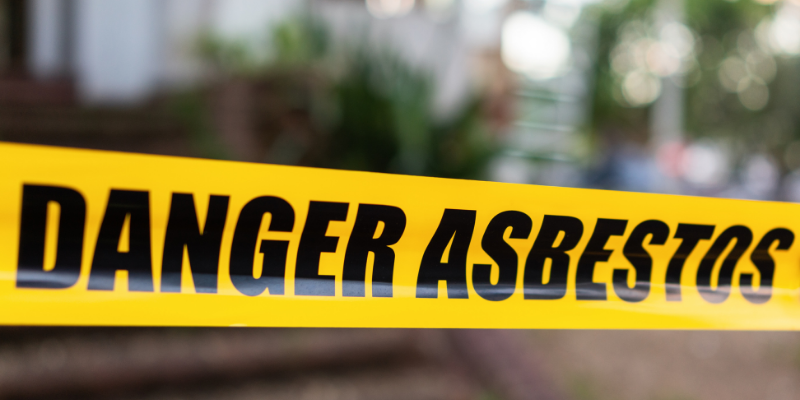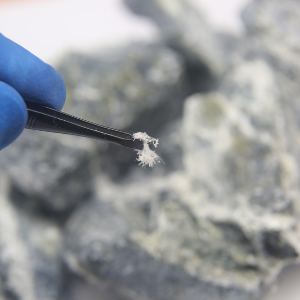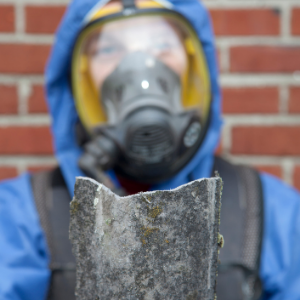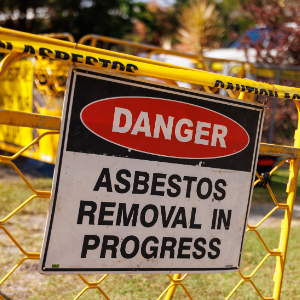
Understanding Asbestos: Risks and Regulations in Real Estate
Understanding asbestos is essential when selling a home in Charlotte, NC, because it poses substantial concerns and is subject to stringent restrictions. Asbestos, a naturally occurring mineral long known for its fire-resistant properties, can be found in older homes in insulation, roofing shingles, and floor tiles.
Asbestos fibers can cause significant health problems such as lung cancer and mesothelioma; thus, their removal should be a top priority in real estate transactions. In North Carolina, special regulations control the disclosure and handling of asbestos during property sales.
Before advertising their home, homeowners must have certified professionals inspect it for asbestos-containing items. Compliance with local and federal asbestos removal or encapsulation rules is critical to avoiding legal liability.
Understanding these hazards and regulatory requirements protects potential buyers and speeds up sales by avoiding delays caused by unreported asbestos issues.
Legal Requirements for Selling a House with Asbestos

When selling a home containing asbestos in Charlotte, NC, homeowners must follow strict regulatory criteria to ensure compliance and transparency. North Carolina law requires full disclosure of any known asbestos presence to prospective buyers, which is critical for preserving confidence and avoiding future legal concerns.
Sellers should get an asbestos inspection from a competent professional to validate the material’s presence and condition. If asbestos is discovered, a full report for prospective buyers is required.
While federal restrictions under the Environmental Protection Agency (EPA) do not necessitate removal if the asbestos is intact and undisturbed, the seller must disclose any remedial efforts made or required. North Carolina’s disclosure requirements are more stringent than in other states, where asbestos-related declarations may be optional or vary by jurisdiction. Failure to disclose known hazardous materials, such as asbestos in Charlotte, can lead to legal consequences and financial fines.
It is recommended that homeowners speak with real estate specialists knowledgeable about these legal complexities to ensure a seamless transaction while complying with all necessary disclosures and safety standards.
Evaluating the Impact of Asbestos on Property Value
When selling a house in Charlotte, NC, asbestos can substantially impact property value, so homeowners must know its ramifications. Once widely utilized in construction materials due to its fire-resistant characteristics, asbestos is now proven to cause significant health concerns if fibers become airborne.
As a result, potential buyers may consider homes containing asbestos less appealing due to the high expenses and health risks connected with its removal or management. This assumption frequently leads to lower offers or a longer time on the market.
Homeowners may consider hiring a professional asbestos inspector to analyze the presence and extent of the asbestos. Addressing asbestos issues through effective abatement can help reduce adverse effects on property value and reassure potential purchasers.
In Charlotte’s competitive real estate market, where buyers are becoming more conscious of environmental risks, a proactive approach can significantly increase a home’s marketability and price.
Financial Implications of Selling a House Containing Asbestos Materials
Selling a home in Charlotte, NC that contains asbestos materials can have serious financial consequences for homeowners. Asbestos typically results in lower property prices because potential buyers are put off by the health hazards and the costs involved with asbestos removal or remediation. Homeowners may need to invest in expert asbestos inspections and abatement services to meet regulatory obligations and make their property more appealing to potential buyers. These services can be expensive, affecting the overall profit from the sale.
Furthermore, failure to disclose known asbestos risks may result in legal obligations and additional financial constraints if buyers find secret hazards after the purchase. To address these problems, sellers may try lowering their asking price or issuing repair credits to alleviate buyer worries, but these techniques impact the financial outcome of the sale.
Understanding local restrictions and market conditions is critical for homeowners looking to avoid financial losses when selling an asbestos-contaminated home in Charlotte. When selling a house with asbestos, homeowners should consider probable abatement expenses, lower property value, and insurance costs. Standard homeowner’s policies may limit coverage for environmental risks, such as asbestos, so sellers may need to look into supplementary or specialized insurance options.
Consult with an insurance agent familiar with local requirements to ensure sufficient protection and reduce financial risk during the transaction. Addressing insurance concerns ahead of time can enhance buyer trust and remove any roadblocks in the sales process.
To avoid the hassle and cost of asbestos inspections or repairs, homeowners can turn to Zack Buys Houses. They buy homes as-is across Charlotte—including Concord, Gastonia, and Rock Hill—and can help you sell your house fast for cash, even with asbestos concerns. Zack’s team offers fair prices and flexible closing to simplify the process.
Preparing Your Home for Sale: Managing Asbestos Concerns

Understanding how to prepare your Charlotte, NC, home for sale and manage asbestos risks is crucial to a successful and safe transaction. First, have a qualified asbestos inspector evaluate potential issues for insulation, flooring, and roofing materials.
Homeowners should employ an abatement specialist to remove or encapsulate asbestos. Poor handling can harm health and devalue property. The law requires sellers to disclose asbestos; honest communication with buyers can help avoid legal complications.
Open houses and showings must be safe for visitors. All asbestos-containing areas should be marked and made inaccessible. Virtual tours and house airflow optimization can further minimize concerns. These actions show buyers that the home is maintained according to local norms.
Proactive asbestos management and safety measures can increase buyer trust, marketability, and home-selling ease.
Homeowners may renovate to lessen exposure hazards and boost marketability. For licensed asbestos abatement professionals, sealing problematic areas or replacing materials during remodeling can reassure buyers and increase value.
How to Conduct an Inspection for Asbestos Before Selling
Before listing a property in Charlotte, NC, homeowners should schedule a thorough asbestos survey to comply with municipal standards and safeguard future purchasers. While asbestos was common in many building materials, its risk is limited to when it is damaged or disturbed.
Engaging a state-licensed asbestos consultant is critical; these specialists possess the skills to identify asbestos in thermal insulation, vinyl floor tile, cementitious boards, and roofing felts. A comprehensive survey integrates a meticulous visual examination with the acquisition and laboratory analysis of sampled materials.
Homeowners must confirm that the inspector possesses certification from the Environmental Protection Agency or the appropriate state agency. Precise identification of asbestos-bearing materials enables sellers to address issues proactively, whether through secure removal by a certified abatement firm or reliable encapsulation.
Executing the asbestos survey at the beginning of the sales cycle enables property owners to present verifiable due diligence, to reassure potential buyers of the property’s safety, and to streamline negotiations within Charlotte’s competitive market.
Secure Certified Experts for Asbestos Assessment and Removal
Homeowners intending to sell property containing asbestos in Charlotte, North Carolina, must engage certified specialists for testing and abatement. Using qualified personnel ensures adherence to local regulatory and safety protocols, thus safeguarding prospective buyers and the asset’s overall market valuation.
Professional inspectors are trained to identify asbestos-containing materials with precision. Upon confirmation of asbestos, state-licensed abatement contractors execute the removal or encapsulation with specialized equipment and containment procedures. Their expertise minimizes the risk of airborne fibers and ensures the project meets North Carolina’s stringent environmental statutes, an essential condition for transparent and successful real estate transfers.
By prioritizing certified services, sellers prioritize occupant health and facilitate a smoother transaction process, which is especially advantageous in Charlotte’s active property market.
Remediation Options: Removing or Encapsulating Asbestos in Homes
Charlotte homeowners selling asbestos-containing homes must use safe, federal, and state-compliant treatment procedures. The major approaches are removal and encapsulation.
Professional asbestos abatement contractors must contain and remove asbestos. Eliminating the hazard and permanently avoiding further exposure requires a lot of labor, specialized equipment, and state-mandated disposal fees. Polymeric sealants encapsulate asbestos fibers and prevent airborne escape. The property owner must monitor and maybe reapply the encapsulant, which is faster and cheaper than removal.
Each property must choose removal and encapsulation based on prices, timelines, and asbestos status. Hire qualified abatement professionals to survey and prepare a cleanup plan that fulfills North Carolina Momentary Abatement Guidelines and EPA Asbestos National Emission Standards for Hazardous Air Pollutants.
Homeowners often enclose or remodel asbestos-containing materials. These methods lessen risks and improve home beauty and functionality. Qualified asbestos professionals must lead all initiatives to meet North Carolina’s safety and regulatory criteria.
Best Practices for Disclosing Asbestos in Property Listings
When selling a home that contains asbestos in Charlotte, NC, owners must follow established protocols for informing potential buyers about the material’s presence. Accurate disclosure is a matter of law and a means of fostering trust during the sale.
Listings should specify where asbestos is located and describe its condition. An accredited asbestos inspector should conduct an on-site evaluation, and the resulting report will serve as definitive proof of the material’s presence.
This report should then be included in the seller’s disclosure package, demonstrating that the seller’s statements are based on a scientific assessment. Full disclosure mitigates the risk of future liability and empowers buyers to make informed choices.
Adhering to Charlotte’s asbestos disclosure regulations is fundamental. Doing so expedites the transaction while satisfying North Carolina’s real estate statutes. Sellers who acknowledge known asbestos concerns exhibit responsible stewardship, simplifying the process for buyers, agents, and attorneys.
Developing Successful Marketing Strategies for Homes with Asbestos Issues
When selling an asbestos-containing Charlotte, NC, house, a well-planned marketing strategy is needed to attract serious purchasers and address their concerns. Focusing on the house’s design, location, or modernized systems can distract from the asbestos.
We cannot negotiate transparency. Buyers should receive a thorough asbestos survey, interim containment, and final abatement results from sellers. This transparency boosts buyer confidence and lowers risk.
Environmentally liable property real estate agents are also beneficial. Such agents can showcase the home well and attract buyers who might otherwise overlook it. Online listings increase visibility; high-resolution photos and interactive virtual tours may show a home’s character without asbestos.
Incentives like competitive pricing or closing cost assistance might boost sales. Sellers might reduce concern and speed up closing by portraying asbestos as a manageable factor under survey oversight or abatement.
Navigating Buyer Concerns: Addressing Common Questions About Asbestos
Effectively addressing buyer concerns is essential when marketing a house containing asbestos in Charlotte, NC. Homeowners must anticipate common questions regarding the material’s presence and its implications.
Prospective buyers often ask about health implications and the impact on resale value. It is essential to clarify that asbestos poses a health risk only when fibers are disturbed and airborne; therefore, the hazard diminishes when the material is left intact or managed according to regulations.
Sellers should furnish documentation of any previous asbestos assessments or remediation done on the property. Demonstrating compliance with local health guidelines and presenting clear, honest records can ease buyer worries.
A clear understanding of the costs of further abatement or encapsulation measures may also reassure buyers. When sellers actively acknowledge these issues and offer informed responses, they can build buyer confidence and facilitate a smoother transaction.
Implementing Safety Measures During Open Houses and Showings
When marketing a property in Charlotte, NC, that contains asbestos, sellers must implement prudent measures during open houses and showings to protect prospective buyers and agents. Homeowners should map all asbestos-containing locations and restrict access to these areas before guests arrive.
Disclosure forms must reveal the asbestos condition and prominently display signage that confirms compliance with municipal regulations. Engaging a certified inspector to survey the entire structure and seal and encapsulate any exposed materials can substantially mitigate the hazard.
To further lower the risk of exposure, sellers might schedule showings during off-peak hours or offer virtual walkthroughs. Enhancing ventilation by opening windows or operating portable air filtration units can further dilute any potential airborne fibers.
By following these procedures, sellers demonstrate a commitment to safety and the welfare of everyone involved in the transaction.
The Role of Real Estate Agents in Selling Properties with Asbestos

Real estate brokers are critical in selling asbestos-containing properties in Charlotte, North Carolina. Their command of the region’s asbestos disclosure laws enables them to guide homeowners in fulfilling statutory obligations, ensuring that every step of the transaction remains legally sound.
An experienced agent assesses the market implications of the asbestos hazard, developing pricing models that attract prospective purchasers while remaining within the bounds of statutory requirements. They disclose the presence of asbestos in ways that convey the necessary information while minimizing the risk of seller liability and the likelihood of sale inertia.
These professionals maintain ongoing partnerships with licensed asbestos inspectors and certified abatement contractors. Their established networks ensure that property assessments and subsequent remediation are carried out promptly, thoroughly, and in full compliance with safety and regulatory mandates, thereby preventing delays that often beset such transactions.
By marrying legal expertise with market acumen and a well-curated roster of contractors, brokers enable homeowners to address the complexities of asbestos-related sales with informed decisiveness and a strategic edge in Charlotte’s competitive real estate environment.
Can You Legally Sell a House with Asbestos?
Selling a residence containing asbestos in Charlotte, NC, is permissible, provided that certain statutory obligations and disclosure mandates are observed. Asbestos, frequently encountered in older building materials, poses health risks primarily when its fibers become airborne. Consequently, the North Carolina Residential Property Disclosure Act obligates sellers to inform prospective purchasers of its presence. The disclosure must be truthful and encompass any known defects, ensuring the buyer can make a fully informed decision.
Although federal and state statutes do not mandate that asbestos be abated before sale, remediation can enhance the attractiveness and perceived safety of the property. Property owners are strongly advised to engage state-licensed asbestos assessors and abatement contractors, who can evaluate and, if warranted, remediate the material by the applicable safety and building codes.
Sellers should also familiarize themselves with Charlotte’s specific real property statutes and can benefit from the assistance of a knowledgeable real estate agent. Such professionals can guide sellers and purchasers through the procedural and regulatory landscape, facilitating a more efficient and legally compliant transaction.
Do You Have to Disclose Asbestos in NC?
In Charlotte, NC, sellers must notify prospective buyers of any asbestos in the property. Under North Carolina law, the Residential Property and Owners’ Association Disclosure Statement must be completed, and that statement explicitly inquires about the presence of known hazardous substances, including asbestos.
Failure to disclose asbestos can result in significant liability and delay the transaction. The mineral’s fibrous nature once rendered it an effective insulator and fireproofing agent, but when those fibers are disturbed, they pose a serious inhalation hazard linked to chronic respiratory disease.
Given the potential consequences, sellers should engage a licensed asbestos inspector to comprehensively evaluate the property before listing it. Full disclosure of asbestos findings and prompt remediation of risks fulfills statutory obligations and fosters buyer confidence in an increasingly competitive Charlotte housing market.
Is It a Bad Idea to Buy a House with Asbestos?
For homebuyers in Charlotte, discovering asbestos can cause understandable concern. Although mineral production was curtailed mainly in the United States by the late 1970s, the city’s older homes frequently harbor it in acoustical ceiling tiles, pipe wrapping, and certain exterior sidings.
Acquiring such a property is not inherently imprudent, provided that caution is exercised. Buyers should commission a detailed asbestos assessment, establish whether the material is sealed and intact, and examine any available remediation or management documentation. When qualified contractors remove the associated exposures, they can be minimized; conversely, undamaged asbestos systems usually necessitate only periodic surveillance.
Consequently, while asbestos continues to be an inherent risk in Charlotte’s housing stock, knowledgeable purchasers can navigate the situation effectively, safeguarding health and economic interests.
Does Asbestos Lower Home Value?
In Charlotte, NC, the discovery of asbestos during a home inspection commonly results in diminished appraisals and market value. Knowledgeable buyers understand the carcinogenic risk posed by airborne asbestos fibers. Once this condition is disclosed, the buyer pool shrinks while negotiations shift to cover anticipated removal and regulatory costs.
Residences constructed before 1980 are the principal candidates for asbestos-containing materials, raising concerns about the monetary burden of remediation and long-term health liabilities. Given the competitive Charlotte market, a home containing the substance will likely receive a lower appraisal than comparable properties, compressing the anticipated market value.
Sellers are encouraged to commission a certified asbestos survey before listing and, if the analysis warrants, budget for a licensed abatement contractor. Addressing confirmed asbestos hazards promptly can increase a property’s appeal and substantially lessen its adverse effect on its appraisal.
For homeowners looking to avoid the stress and uncertainty of traditional real estate transactions—mainly when asbestos is involved—Zack Buys Houses provides a fast, reliable, and professional solution to selling their Charlotte home for cash. No repairs, clean-up, or delays are required. Contact us at (704) 769-0141 to get your offer today!
Helpful Charlotte Blog Articles
- Selling Your Charlotte Home After A Few Years
- Optimal Seasons For Selling A Home In Charlotte, NC
- Navigating a Reverse Mortgage Sale in Charlotte, NC
- Selling A Mold-affected House In Charlotte, NC
- Comprehensive Guide To Replumbing Your Charlotte Home
- Selling A Water-Damaged House In Charlotte, NC
- Selling Inherited Property In Charlotte, North Carolina
- Selling Your Duplex In Charlotte, NC Quickly And Profitably
- Selling Jointly Owned Real Estate In Charlotte, NC
- Selling Inherited Property In Charlotte, North Carolina
- Understanding Charlotte, NC Property Tax Rates
- Guide To Selling A House With Asbestos In Charlotte, NC
- Understanding Home Equity Requirements For Selling Your Charlotte, NC House

| AMOSITE | REAL ESTATE BROKER | COMPARATIVE MARKET ANALYSIS | REALTOR | PROPERTY DEED | ATTORNEY |
| LAWYERS | INSURANCE CLAIMS | MORTGAGE | TITLE INSURANCE | TITLE COMPANY | HOME INSPECTION |
| HOME INSPECTOR | ASBESTOS REMEDIATION | ESCROW | CANCERS | MALIGNANT TUMORS | MECKLENBURG COUNTY |
| MECKLENBURG | HEALTH PROBLEMS | DISEASES | CASH | PAYMENT | MONEY |
| LUNGS | LUNG FUNCTION | LOAN | HOMELIGHT | CHRYSOTILE | |
| CHRYSOTILE ASBESTOS | SERPENTINE ASBESTOS | MINERALS | MESSAGE | MEMBRANE | HOA |
| HEAT | HEATING | WALLS | CHEST | CHEST CAVITY | CLOTH |
| PRIVACY | NEGOTIATIONS | LENDER | ASBESTOSIS |
